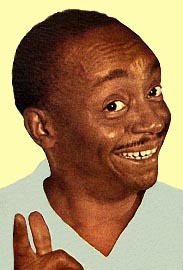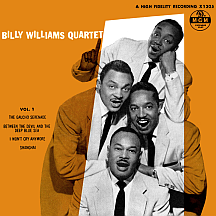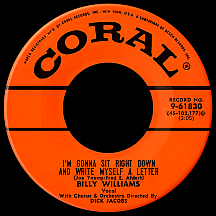BILLY WILLIAMS
I'm Gonna Sit Right Down
and Write Myself a Letter
Some of the 1950s songs we refer to as "oldies" (at least in the way deejay Art Laboe, creator of the surprise hit Oldies But Goodies album series, popularized the term) were remakes of much older oldies (as in the Tin Pan Alley variety, pre- and post-Depression era). Take for instance "I'm Gonna Sit Right Down and Write Myself a Letter" (with its sad second line '...and make believe it came from you!'), written in 1935 by true-blue New Yorkers Fred E. Ahlert and Joe Young. Piano master Fats Waller's amiably-delivered recording of the song hit big that year; a livelier version with added lyrics was a top seller for Crescent City trio The Boswell Sisters several months later in early '36. Apparently the best approach for a 1957 revival was to make the melancholy lyrics sound as joyful as possible, which Chicagoan Billy Williams did, playfully shouting "Oh yeah!!" in four places. It worked...and 46-year-old Williams, who'd come up during that earlier era of Waller, had himself a late-career million seller.
While still in his teens, Billy (birth name: Wilfred) was a founding member of The Charioteers, a vocal group formed in 1930 at Wilberforce University in the city of Wilberforce, Ohio. They performed regularly on WLW radio in Cincinnati and by the time Decca Records signed them in 1935, a few lineup changes had taken place. Billy, Howard Daniel, Ira Williams and Eddie Jackson comprised the classic act that was featured in the long-running late-'30s Broadway musical Hellzapoppin', became regulars on Kraft Music Hall, hosted by the era's top music star Bing Crosby, backed Mildred Bailey on records and appeared in several film shorts including Road Show in 1941 and The Darktown Strutters Ball in '42. Some of the group's best-known hits, all from a lengthy stretch with Columbia Records, include 1945's "Don't Forget Tonight Tomorrow" backing Frank Sinatra, their cover of the much-recorded "Open the Door, Richard!" in '47 and "A Kiss and a Rose" in '49.
Billy left the Charioteers in 1949 and formed The Billy Williams Quartet with baritone Claude Riddick, tenor John Ball and bass Eugene Dixon. Big breaks came quickly: in 1950 the BWQ signed with MGM Records and within months became regular cast members on NBC's Your Show of Shows starring the side-splitting Sid Caesar and Imogene Coca. In the summer of '51, Billy's Quartet hit the top 20 with "(Why Did I Tell You I Was Going To) Shanghai," a wittily theatric version of the Bob Hilliard-Milton DeLugg song hitting big at the time for Doris Day. Successive MGM singles varied in approach, most were less comedic than the one hit and many were sorely dated, but the level of professionalism was obvious...on records as well as the weekly TV series.
Billy and his band moved to Chicago's Mercury label in 1952 and retained the high standard set with the MGM recordings, yet sales were disappointing. Your Show of Shows ended its run in 1954 around the time the group jumped from Mercury to Decca's Coral label, starting things off with a flatlining cover of The Chords' R&B hit "Sh-Boom (Life Could Be a Dream)," their version leaning closer to the original than the pop smash by The Crew-Cuts that enjoyed several weeks at the top of the charts. A remake of Joe Liggins' ten-year-old "The Honeydripper" sought to give it a little more rock and roll punch, then "I Wanna Hug You, Kiss You, Squeeze You (That's What's the Matter With Me)" featured a spoken intro by Alan Freed and increased the rhythmic roll by several notches. Regardless, Billy and his foursome came up absent from the best seller charts through the end of '55.
"A Crazy Little Palace (That's My Home)," an enjoyable '50s lifestyle ditty written by Cal Rotherman, "Papa Loves Mambo" man Bix Reichner and Philly music mogul Bernie Lowe, took Billy into the top 50 in April 1956. The quartet seemed to have been phased out as they were seldom billed on labels after this, coinciding with orchestra leader Dick Jacobs' increasing role of producing and arranging. "The Pied Piper," a fast-moving number penned by Misissippi-born rocker Lee Denson, ranks among the best of Williams' singles; in March of '57, it too rose above the halfway mark on the Hot 100.

Then came 1957's smash "I'm Gonna Sit Right Down and Write Myself a Letter," its prominent brass arrangement and 'ba-ba-ya...ba...ba-ya' female flavoring putting its stamp on the summer over the course of spending several weeks in the top ten. Never mind that Billy's "Oh yeahs" had been lifted from trailblazing black comedian Timmie Rogers' standup routine! Coral albums and EPs turned it into an I.D. of sorts (Mercury jumped on the "Oh yeah" bandwagon as well, using it on reissues of older material) and for a time Billy was more closely connected to the phrase than Rogers. On the 1958 hit single "Back to School Again," credited to Timmie "Oh Yeah!" Rogers, the well-dressed, bug-eyed comic resorted to exclamations like "Goodness gracious!" and "Holy mackerel!" before eventually milking the "Oh yeah" gag for a few more decades in his very funny comedy routines.
Williams had positioned himself for a few additional years of regular network appearances and more mid-charting hit singles. "Got a Date With an Angel" (with a cool four-second organ bridge) and "Baby, Baby" were astutely arranged, while another Ahlert chestnut (this one composed with Roy Turk), "I'll Get By (As Long as I Have You)," reprised the arrangement of "I'm Gonna Sit Right Down." "Nola" (originally a 1915 instrumental by Felix Arndt with lyrics supplied later by Sunny Skylar) reached the top 40 in early '59...could it be the song's closing (a softer "Oh, yeah...") had something to do with it?
A spirited take on Leadbelly's "Goodnight Irene" was Billy's final charting single in April of '59, but there were several more releases through late 1960. Barbara McNair (future Motown artist and TV star) had signed with Coral Records in 1957 and her debut disc, "Bobby," came late in the year. After several more unsuccessful singles, she was teamed with Billy for a remake of "Go to Sleep, Go to Sleep, Go to Sleep," a cute novelty that had been a hit for Mary Martin and Arthur Godfrey in 1950. Predictably, the song ends with Billy saying "Oh, no!" and Barbara saying "Oh, yeah!"
Semi-retirement came at age 50 when his recording career stalled, nightclub gigs became scarce and TV appearances ever scarcer. There was one reprieve in 1965 and '66 when he emerged as a featured performer on The All-Time Hits, a variety show hosted by singer Bob Carroll that was broadcast on WGN-TV in Chicago. Surviving tapes of the series reveal a 55-year-old Billy Williams in fine form, looking great and singing as well as he had during his not-so-long-gone heyday. It amounted to an impressive farewell to show business, as his health faltered over the next few years. He passed away in October 1972, likely due to a late life struggle with diabetes.



